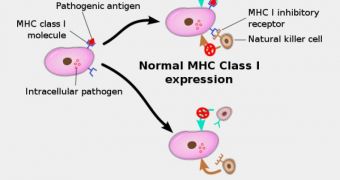One of the most important types of immune-system cells in the human body is the natural killer (NK) cells. They are among the first to respond to an emergency, such as a pathogen infection, by arriving at the scene and immediately beginning to kill off the intruders. Once activated, these little killers stop at nothing until the threat is eliminated. They even kill off the cells in the body that have been already infected, so as to minimize any risk of a relapse. Now, new evidence suggests that they also play a crucial role in keeping the entire immune system in balance, by controlling the response of T cells.
The latter class of immune-system cells also plays a major role in cell-mediated immunity, and has a natural tendency to over-react when it detects intruders. The new study, conducted by researchers at the Brown University, in the United States, shows that NK cells play a direct role in muffling T cells' response once the threat has been eliminated. This is a very important feat, as it essentially keeps a person's immune system from attacking the body's own healthy cells. As a direct result, T cells can continue to play an important part in the body's adaptive immune system, able to learn new things.
“The work reveals two important aspects of NK cell biology, the first piece being understanding how to keep NK cells instead of losing them. The second is that if you can keep them around, they have an important regulatory function to limit adaptive immune response. If you don't have them during long challenges, your adaptive immune system response could go unregulated and lead to death,” the Esther Elizabeth Brintzenhoff Professor in the BU Department of Molecular Biology, Cell Biology and Biochemistry, Christine Biron, explains the find.
She is also a professor of medical sciences at the university, and the lead author of a new study detailing the finds, published in the September issue of the Journal of Experimental Medicine. The expert also says that a particular kind of activating receptor is required in order to keep NK cells around. Otherwise, the immune system simply loses them. When activated, NK cells produce the cytokine known as interleukin-10 (IL-10), which is the main structure responsible for reducing the activity level of T cells.
The new research could bear vast implications for medicine, as well as a change in the way healthcare experts propose therapies. Keeping a balanced immune system could thus become the primary focus of treatment, the expert says. “You want the right balance. This [study] could help create the right balance,” she concludes.

 14 DAY TRIAL //
14 DAY TRIAL //